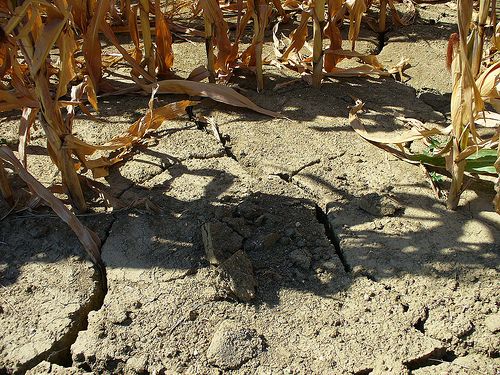 Photo courtesy KouK’s via FlickrOkay, it may not exactly be an elephant stampede, but there is real movement on the climate bill by key swing Senators, as E&E Daily makes clear in an excellent new analysis, “On road to 60, Senate swells with fence sitters.” They count 31 “yes” votes, 11 “probably yes,” and
Photo courtesy KouK’s via FlickrOkay, it may not exactly be an elephant stampede, but there is real movement on the climate bill by key swing Senators, as E&E Daily makes clear in an excellent new analysis, “On road to 60, Senate swells with fence sitters.” They count 31 “yes” votes, 11 “probably yes,” and
24 senators now belong in the “fence sitter” category that leaves them up for grabs headed into the winter push for 60 votes that sponsors will need to overcome an expected Republican filibuster.
That should read “expected (and immoral) conservative filibuster” — since it now seems clear, the bill will get a number of GOP votes (see “Murkowski praises Kerry-Graham climate plan. The Washington Times writes, “Her remarks signal the potential for a major turn in the climate change debate in Congress”).
I’ll list the Senators in each category below, but first it is worth noting continued movement by one key swing Senator, Lisa Murkowski (R-Alaska). As Reuters and the NY Times reported over the weekend:
A senior Republican in the United States Senate, conservative Senator Lisa Murkowski, said she would consider voting for a “cap and trade” climate change bill Democrats are pushing if it also contains a vigorous expansion of nuclear energy and domestic oil drilling.
“Count me as one of those who will keep my mind open as we move forward,” she said in a C-SPAN interview that aired Sunday. In the interview she said she recently talked with Sen. Graham about its bipartisan proposals and “It was a good conversation.” She acknowledged the state has been ravaged by climate change:
“When you see changes to the land coming about … what is causing the loss of the sea ice that adds to the erosion issues, yes, in Alaska we are seeing change,” she said. “That’s why I have been one of those Republicans who has stepped out front a little bit more on the issue of climate change.”
So I think the final bill has a very realistic chance of getting her vote. For more, see her updated Grist profile.
Here are some specifics from E&E:
For starters, the bill’s lead sponsors, Sens. John Kerry (D-Mass.) and Barbara Boxer (D-Calif.), can safely rely on 31 “yes” votes as they work on building their coalition. That list includes Ben Cardin of Maryland, Jeanne Shaheen of New Hampshire and Tom Udall of New Mexico. All appeared at a Capitol Hill campaign-style rally last month during the public unveiling of the legislation, S. 1733.
Here is that list:
- Daniel Akaka (Hawaii)
- Barbara Boxer (Calif.)
- Ben Cardin (Md.)
- Tom Carper (Del.)
- Chris Dodd (Conn.)
- Dick Durbin (Ill.)
- Dianne Feinstein (Calif.)
- Tom Harkin (Iowa)
- Kirsten Gillibrand (N.Y.)
- Daniel Inouye (Hawaii)
- Ted Kaufman (Del.)
- John Kerry (Mass.)
- Paul Kirk (Mass.)
- Amy Klobuchar (Minn.)
- Herbert Kohl (Wis.)
- Frank Lautenberg (N.J.)
- Patrick Leahy (Vt.)
- Joe Lieberman (Conn.)
- Robert Menendez (N.J.)
- Jeff Merkley (Ore.)
- Barbara Mikulski (Md.)
- Patty Murray (Wash.)
- Jack Reed (R.I.)
- Harry Reid (Nev.)
- Bernie Sanders (Vt.)
- Charles Schumer (N.Y.)
- Jeanne Shaheen (N.H.)
- Mark Udall (Colo.)
- Tom Udall (N.M.)
- Sheldon Whitehouse (R.I.)
- Ron Wyden (Ore.)
Then we have the 12 probables:
Another 12 senators fall into the “probably yes” camp, from Michael Bennet of Colorado to Al Franken of Minnesota and Mark Warner of Virginia. Bennet and Warner are not slam dunks given the fossil fuel interests in their home states, while Franken dropped off the “yes” list when he signed a letter with nine other Democrats in August that raised concerns about President Obama’s stance against trade sanctions on carbon-intensive goods from developing countries that do not have strong enough climate policies.
- Roland Burris (Ill.)
- Michael Bennet (Colo.)
- Jeff Bingaman (N.M.)
- Robert Casey (Pa.)
- Susan Collins (Maine)
- Russ Feingold (Wis.)
- Al Franken (Minn.)
- Kay Hagan (N.C.)
- Tim Johnson (S.D.)
- Bill Nelson (Fla.)
- Olympia Snowe (Maine)
- Mark Warner (Va.)
Finally we have the 24 fence sitters:
As for the fence sitters, the list continues to swell from both directions as key senators hedge their bets.
For example, Sens. Max Baucus (D-Mont.) and Maria Cantwell (D-Wash.) no longer reside in the “probably yes” camp given their recent statements on allocations and oversight of the carbon markets, respectively. Baucus may drive the hardest bargain as chairman of the Finance Committee, where he is sure to negotiate on behalf of coal-state Democrats who think the House-passed bill unfairly favors electric utilities that service the East and West coasts.
Two senators have recently been upgraded to the fence from the “probably no” camp are Sens. Robert Byrd (D-W.Va.) and George Voinovich (R-Ohio). Byrd has long questioned action to curb emissions but has taken a lead role on carbon sequestration language that Kerry and Boxer are trying to wrap into their proposal. Voinovich has a reputation for bipartisan consensus building, and recent signals supporting the nuclear power industry are raising hopes in some sectors that the retiring senator should still be considered in play.
“If you engage in a very proactive way to get a bill done, he will negotiate and compromise,” said a former Senate Republican aide.
E&E’s analysis is based on interviews with senators, plus dozens of Democratic and Republican sources, industry and environmental groups …
GOP interest is significant for the climate bill’s overall prospects given that Democrats are unlikely to carry all 60 of their own votes on the floor.
In all, E&E now lists eight Republicans as “fence sitters” on the climate bill, with the two from Maine — Susan Collins and Olympia Snowe — holding firm as “probably yes” votes given their past efforts on the issue. Collins and Snowe are likely to compensate for the loss of Sens. Mary Landrieu of Louisiana and Ben Nelson of Nebraska, the only Democrats listed among 11 “probably no” votes given their many comments questioning the environmental agenda of the Obama administration and Senate leaders.
Elsewhere, sponsors got their biggest boost when Kerry went public with Sen. Lindsey Graham (R-S.C.) on a partnership that they had been quietly working on since the summer. The senators pledged in an Oct. 11 New York Times op-ed that they would try to find compromise on several key areas, including nuclear power, offshore drilling and a border tax on items produced in countries that avoid high environmental standards.
“I can see a way to get to 60 votes, and so can he, if we pull the right folks to the table and do this in the right way,” Kerry said last week. “And that’s what we’re going to do.”
There are also a lot of fence-sitting Dems:
Sen. Sherrod Brown of Ohio, for example, is crafting language to help manufacturers.
From July: Sherrod Brown (D-Ohio) says he won’t filibuster climate bill.
Michigan’s Debbie Stabenow hopes to release long-awaited agriculture ideas. And Sen. Arlen Specter of Pennsylvania will be forced to take a stand as early as next month when Boxer’s Environment and Public Works Committee holds a markup on its bill.
Other influential Democratic fence sitters include Michigan Sen. Carl Levin, who said last week that he expects to push at least four issues once the bill nears the floor.
Levin said he will be seeking a national greenhouse gas emission standard and repeal of state-specific standards. Like Franken, he said a border tax adjustment needs to be part of the bill. And Levin said he wants a “fail-safe provision in case the technologies don’t advance as quickly as some people think they will.”
“And you’ve got to fairly proportion the burden,” Levin added.
Agriculture Chairwoman Blanche Lincoln (D-Ark.) also remains on the fence. The two-term senator said last week that she wants to get a better grip on the effect that a climate bill would have on farmers and in the cost of food to consumers.
“I don’t disagree with the objective, and I hope we’ll stay focused on the objective, which is to lower our greenhouse gases and emissions and our carbon output,” Lincoln said.
Lincoln in past years has cosponsored efforts to address the cost fluctuations in climate legislation. Environmental groups are banking on her and Sen. Mark Pryor (D-Ark.) as key votes that get them to across the 60-vote threshold.
But an industry source tracking the climate debate doubts that Lincoln can sign off on climate legislation as she heads into a heated re-election battle next November. “No amount of National Wildlife Federation polling is going to help her in the delta,” the source said. “She has an issue.”
Election-year politics also may influence several other Democrats. Specter faces a primary challenge from his left in Rep. Joe Sestak, a campaign that has put an even larger spotlight on his vote.
From August: Arlen Specter: “No doubt about” voting for cloture on the climate bill
Sen. Evan Bayh (D-Ind.) faces the same unemployment concerns as Lugar but with the added pressure of a 2010 re-election campaign. So far, Bayh has not drawn a significant challenger and political analyst Charlie Cook ranked the race earlier this month as “solid D” for the incumbent. But political observers still see Bayh as vulnerable to home-state concerns.
Other Democrats on the fence include a number of senators representing either coal-consuming or coal-producing states, including Claire McCaskill of Missouri, North Dakota Sens. Kent Conrad and Byron Dorgan, Jay Rockefeller of West Virginia, Jon Tester of Montana, and Jim Webb of Virginia. Conrad and Dorgan may be among the most difficult fence sitters to win over. Both have insisted for months that Senate leaders should start with energy-only legislation and save the big climate change measure for later.
Beyond Nelson and Landrieu (who are listed correctly as probable no votes), Lincoln and Dorgan will be the hardest to get, I’m told.
We may get only 56 or 57 Democratic votes for cloture — and thus may need at least four and preferably five or more GOP’ers, which I think is now in sight. The bill is not a sure thing, but it is likely, especially since Obama is ramping up his push. More on that later.
Here is the full list of 24 on the fence:
- Max Baucus (Mont.)
- Evan Bayh (Ind.)
- Mark Begich (Alaska)
- Sherrod Brown (Ohio)
- Robert Byrd (W.Va.)
- Maria Cantwell (Wash.)
- Kent Conrad (N.D.)
- Byron Dorgan (N.D.)
- Lindsey Graham (S.C.)
- Judd Gregg (N.H.)
- George LeMieux (Fla.)
- Carl Levin (Mich.)
- Blanche Lincoln (Ark.)
- Richard Lugar (Ind.)
- John McCain (Ariz.)
- Claire McCaskill (Mo.)
- Lisa Murkowski (Alaska)
- Mark Pryor (Ark.)
- Jay Rockefeller (W.Va.)
- Arlen Specter (Pa.)
- Debbie Stabenow (Mich.)
- Jon Tester (Mont.)
- George Voinovich (Ohio)
- Jim Webb (Va.)
Those are the ones to focus attention on, especially Dorgan, Gregg, LeMieux, Lincoln, Lugar, McCain, Murkowski, and Voinovich. Getting at least two of those and preferably three or more would probably give us the bill.



